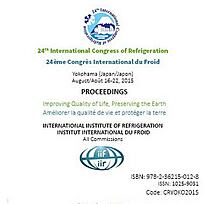
IIR document
Ejector refrigeration systems for waste heat recovery applications: effects of condensation on performance.
Number: pap. n. 588
Author(s) : LITTLE A. B., GARIMELLA S.
Summary
As worldwide electricity demand increases and stresses electricity grids to the point of collapse, energy-saving devices have assumed increasing importance. Waste heat recovery systems are currently being considered for applications in air conditioning and refrigeration, like the ejector-based chiller considered here. The key ejector component is a steady-state device with no moving parts, obviating the need for lubricating oils, maintenance, or expensive repairs. An ejector-based chiller is constructed and experiments are conducted to demonstrate cooling over a range of conditions with a miniaturized ejector. It has been hypothesized that the occurrence of condensation at some operational conditions can be used to passively enhance momentum transfer and reduce losses within the ejector. This study experimentally determines the effect of flow condensation on ejector performance and, with analytical treatments of the expected degree of condensation within the ejector itself, uses this information to provide guidance on achieving maximum ejector efficiency and system COP.
Available documents
Format PDF
Pages: 9 p.
Available
Public price
20 €
Member price*
Free
* Best rate depending on membership category (see the detailed benefits of individual and corporate memberships).
Details
- Original title: Ejector refrigeration systems for waste heat recovery applications: effects of condensation on performance.
- Record ID : 30015676
- Languages: English
- Source: Proceedings of the 24th IIR International Congress of Refrigeration: Yokohama, Japan, August 16-22, 2015.
- Publication date: 2015/08/16
- DOI: http://dx.doi.org/10.18462/iir.icr.2015.0588
Links
See other articles from the proceedings (657)
See the conference proceedings
-
Marine application of waste heat to drive eject...
- Author(s) : KEDZIERSKI M., SMIERCIEW K., BUTRYMOWICZ D., et al.
- Date : 2019/08/24
- Languages : English
- Source: Proceedings of the 25th IIR International Congress of Refrigeration: Montréal , Canada, August 24-30, 2019.
- Formats : PDF
View record
-
Experimental study of hybrid ejector system wit...
- Author(s) : YOSHIDA T., ELBEL S.
- Date : 2022/06/13
- Languages : English
- Source: 15th IIR-Gustav Lorentzen Conference on Natural Refrigerants (GL2022). Proceedings. Trondheim, Norway, June 13-15th 2022.
- Formats : PDF
View record
-
Comparative analysis on ejector and converging ...
- Author(s) : KO G. S., RAZA W., PARK Y. C.
- Date : 2023/05/15
- Languages : English
- Source: 14th IEA Heat Pump Conference 2023, Chicago, Illinois.
- Formats : PDF
View record
-
Numerical analysis for performance comparison b...
- Author(s) : YOSHIDA T., ELBEL S.
- Date : 2021/05
- Languages : English
- Source: 2021 Purdue Conferences. 18th International Refrigeration and Air-Conditioning Conference at Purdue.
- Formats : PDF
View record
-
Numerical analysis of hybrid heat driven ejecto...
- Author(s) : YOSHIDA T., ELBEL S.
- Date : 2022
- Languages : English
- Source: 2022 Purdue Conferences. 19th International Refrigeration and Air-Conditioning Conference at Purdue.
- Formats : PDF
View record
